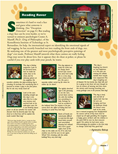Sometimes it’s hard to read a face and guess what someone is thinking. (See “Deception Detection” on page 8.)  But reading a dog’s face can be even harder, so we’ve turned to eminent psychologist Cosmo A. Mastiff, Ph.D. (Dog of Philosophy), of the Kennelfornia Institute of Technology at St. Bernardino, for help. An international expert on identifying the emotional signals of tail wagging, he has recently branched out into reading the front ends of dogs, too. By analyzing one of the greatest and most psychologically perceptive paintings of dogs* ever made, Professor Mastiff unravels what these canines are really feeling. Dogs may never lie about love, but it appears they do cheat at poker, so please be careful if you ever play cards with your pooch, he warns.
But reading a dog’s face can be even harder, so we’ve turned to eminent psychologist Cosmo A. Mastiff, Ph.D. (Dog of Philosophy), of the Kennelfornia Institute of Technology at St. Bernardino, for help. An international expert on identifying the emotional signals of tail wagging, he has recently branched out into reading the front ends of dogs, too. By analyzing one of the greatest and most psychologically perceptive paintings of dogs* ever made, Professor Mastiff unravels what these canines are really feeling. Dogs may never lie about love, but it appears they do cheat at poker, so please be careful if you ever play cards with your pooch, he warns.
This dog is feeling suspicious. Look at his furrowed brow, how he holds his cards close to his chest, and his sideways glance at his neighbor. He wonders whether the pipe-smoking dog is cheating. Or perhaps he’s wondering how it learned to smoke a pipe in the first place. But he sits very nicely. Good sit!
Look at the ears standing straight up: this dog is very alert. But he is also very anxious and worried: look at his wide-open eyes. He is not thinking about poker at all, but whether his master will discover that his favorite pipe has dog drool on it. And how will he explain the teeth marks? Bad dog!
This dog appears to study his cards, but his sleepy, downturned eyes reveal that what he’d really like is a nice, long nap in front of the fire. Oh, and a squeaky rubber carrot toy for when he wakes up. Lie down!
The tightly clenched cigar is the giveaway, as are the ears, turned down and to the side: this bulldog has something to hide. Perhaps he had an accident in the hallway? Aha! The tension in his jaw comes from the effort of hiding that he’s cheating at cards! Very bad dog!
Backs of heads are notoriously difficult to read, but this dog’s head looks smooth and unwrinkled, showing he’s relaxed. He’s had a good night: most of the chips on the table are his. If he only had another ace, he’d be sure to win again. What? He’s cheating with the white bulldog? Very, very bad dog!
This dog is laughing, but there’s no real happiness in it. His eyes are missing the telltale twinkle that reveals true enjoyment. This dog is laughing out of despair. He has barely any chips left, and he is going to bet them all, even though he has no chance of winning, and then roam the streets until morning, knocking over many garbage cans in the process. Bad dog!
This dog is tired, sad, and full of regret; look how low his ears are hanging, and how his eyebrows droop. He doesn’t even look at his cards, but is instead imagining how disappointed his owners will be if they learn that he stayed up all night gambling. He imagines a happy game of fetch with the children in the park. Will he ever be that innocent again? He wishes he had never come. Acknowledging the problem is the first step to change. Good boy! Very good boy!
* We know dogs shouldn’t drink or smoke, but then again, they probably shouldn’t gamble either, so please don’t send us any letters complaining that we’re encouraging puppies to do those things. But if you do catch your puppy playing cards, before punishing him, talk with him gently about why he feels the need to play poker, rather than a healthy game of fetch. Perhaps the most important question you can ask him is, how does he keep the cards from falling out of his paws?
